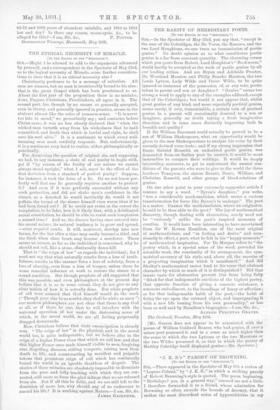THE ETHICAL NECESSITY OF MIRACLE.
[To THE EDITOR OF THE " SPEOTATOR."3 SIR,—Might I be allowed to add to the arguments advanced by yourself, and a correspondent in the Spectator of May 23rd, as to the logical necessity of Miracle, some further considera- tions to show that it is an ethical necessity also ?
Christianity professes to be a message of salvation, All men are sinners, but no man is irretrievably bound to his sins : that is the great Gospel which has been proclaimed to us. About the first part of the proposition there is no mistake; Jews, Pagans, Christians, Freethinkers, all agree in it. The second part, too, though by no means so generally accepted, oven in theory, and generally ignored in praetice, seems in the abstract almost like the voice of common-sense. "It is never too late to mend," we proverbially say ; and centuries before Christ came, it was no less clearly declared that "when the wicked man turneth away from his wickedness that he bath 'committed, and doeth that which is lawful and right, he shall save his soul alive." It is a sentiment to which every well- meaning man most cordially responds. But, unfortunately, it is a sentiment very hard, to realise, either philosophically or practically.
For, dismissing the question of original sin, and supposing
we had, in any instance, a state of real purity to begin with, yet if " by reason of the frailty of our nature we cannot always stand upright," what, I ask, must be the effect of the first deviation from a standard of perfect purity ? Suppose, for instance, it took the form of a lie. Do we not know per-. fectly well that one lie generally requires another to protect it ? And, even if it were perfectly successful without any such protection, and did not shake men's confidence in the sinner, as a detected lie would inevitably do, would it not pollute the breast of the sinner himself even worse than if he had been found out? If he could not resist at the outset the temptation to be false, how is it likely that, with a debilitated moral constitution, he should be able to resist such temptation a second time P And so, the disease having once entered into this moral nature, its natural tendency is to grow and spread, —rires acquirit eundo, It will, moreover, develop into new forms, for the liar after a time may easily become a thief, and the thief, when close beset, may become a murderer. There seems no reason, so far as the individual is concerned, why he .should not roll, like a stone, cOntinually down-hill.
That is," the reign of law" as regards the individual; for I
need not say that what naturally results from a loss of truth- fulness, results in like manner from a loss of sobriety, from a loss of chastity, even from a loss of temper, unless there be some remedial influence at work to restore the sinner to a ,sound condition. But though prophets of old suggested that this was possible, and even philosophers at the present day believe that it is so to some extent, they do not give us any .clear notion of how it is actually done. But while prophets of old were assured that Ged himself would do the work (" Though your sins be as scarlet, they shall be white as snow") our modern philosophers are not clear that there is any God at all, or if there be one, that he will interfere with the universal operation of law under the distressing sense of
which, in the moral world, we are all feeling perpetually dragged downwards. Now, Christians believe that their emancipation is already won. "The reign of law" in the physical, and in the moral world too, is quite indisputable; but we believe also in the Feign of a higher Power than that which we call law, and that this higher Power once made himself visible to men, forgiving sins, dispelling diseases, stilling tempests, raising men from death to life, and counteracting by manifest and palpable tokens that persistent reign of evil which has continually bound the world in an ignoble thraldom of despair. The stories of these miracles are absolutely impossible to dissociate from the pure and lofty teaching with which they are con- nected, still more so from the glad tidings that we are released from sin. Bat if all this be fable, and we are still left to the dominion of mere law, wily should any of us endeavour to amend his life ? It is working against Nature.—I am, Sir, &c.
JAMES GAIRDNER.






































 Previous page
Previous page